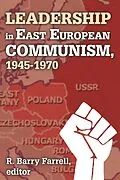Fifteen eminent social scientists from North America and Eastern Europe met under the auspices of Northwestern University's Comparative Politics Program to discuss the significance and characteristics of changes in political leadership in Eastern Europe and the Soviet Union since World War II
Inhalt
1: Theoretical Bases of Soviet and East European Leadership; Introduction; 1: Historical Development of the Communist Theory of Leadership; 2: The Theory of Political Leadership and the Issue of Totalitarianism; 3: Marxist Theories of Leadership: A Marxist Approach; 2: Characteristics of Political Leaders and Leadership; Introduction; 4: Trends in Top Political Leadership in U S S R; 5: Top Political Leadership in Eastern Europe; 6: Representation of Career Types in the Soviet Political Leadership; 7: The Soviet Apparatchiki; 8: Career Characteristics of East European Leadership; 3: Leadership and Society; Introduction; 9: Dynamics of Change: Leadership, the Economy, Organizational Structure, and Society; 10: The Managers; 11: Modernization: New Decisional Models in Socialist Society; 12: Leadership and Group Conflict in Czechoslovakia; 13: Party and Non-Party Attitudes on Societal Change; 4: The Challenge of Change; 14: Some Reflections in Conclusion
